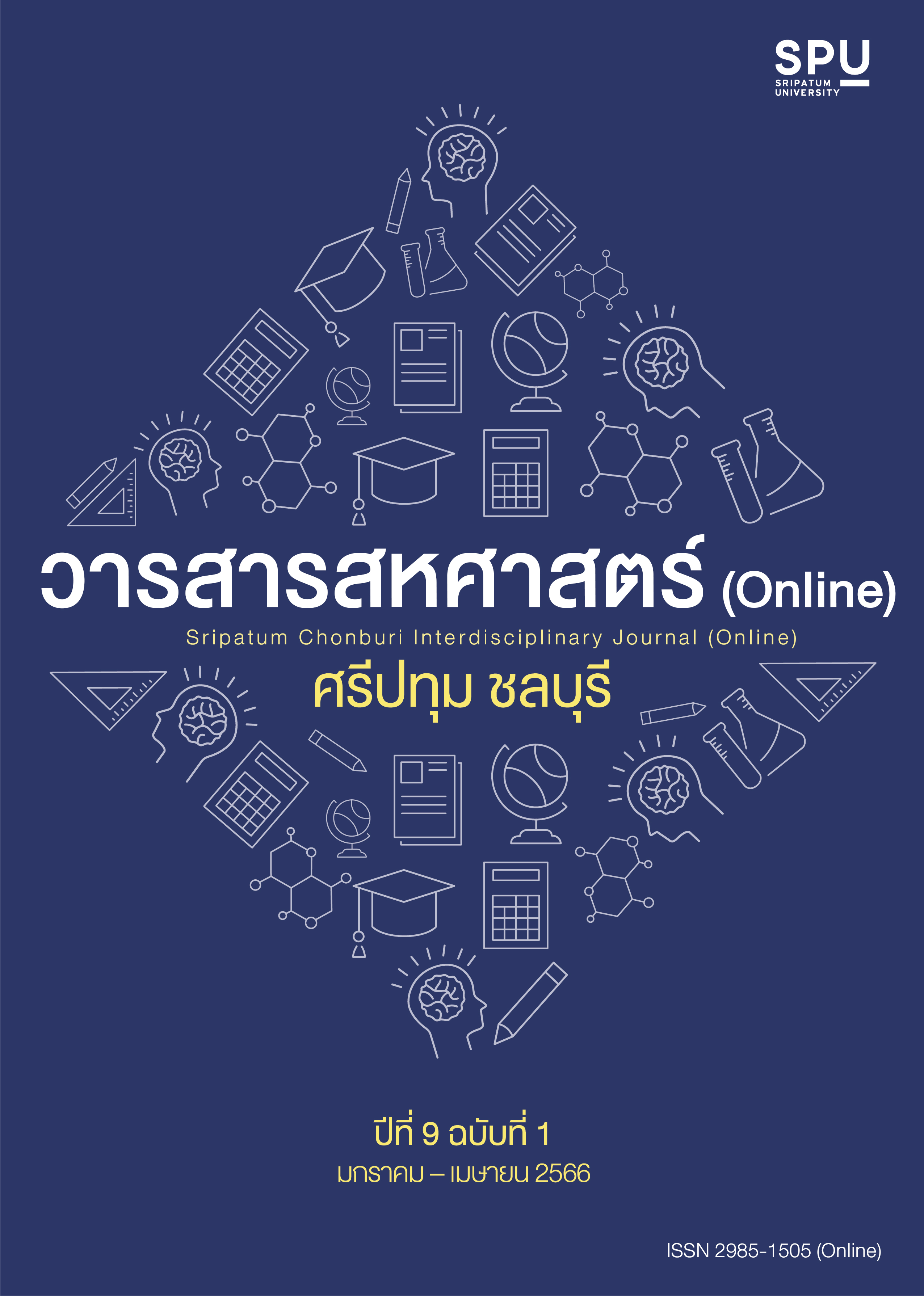อิทธิพลกํากับของการแลกเปลี่ยนความสัมพันธ์ระหว่างผู้นําและผู้ใต้บังคับบัญชา ต่อความสัมพันธ์ระหว่างบทบาทและความตั้งใจลาออก
คำสำคัญ:
ความขัดแย้งในบทบาท, ความคลุมเครือในบทบาท, การแลกเปลี่ยนความสัมพันธ์ระหว่างผู้นำและผู้ใต้บังคับบัญชา, ความตั้งใจลาออกบทคัดย่อ
การศึกษาในครั้งนี้เป็นการวิจัยเชิงปริมาณ มีวัตถุประสงค์ 1) เพื่อศึกษาระดับการรับรู้ ความขัดแย้งในบทบาท ความคลุมเครือในบทบาท การแลกเปลี่ยนความสัมพันธ์ระหว่างผู้นำและผู้ใต้บังคับบัญชา และความตั้งใจลาออก 2) เพื่อศึกษาความสัมพันธ์ระหว่างความขัดแย้งในบทบาท ความคลุมเครือในบทบาทการแลกเปลี่ยนความสัมพันธ์ระหว่างผู้นำและผู้ใต้บังคับบัญชา และความตั้งใจลาออก และ 3) เพื่อศึกษาอิทธิพลกำกับของการแลกเปลี่ยนความสัมพันธ์ระหว่างผู้นำและผู้ใต้บังคับบัญชา ที่มีต่อความสัมพันธ์ระหว่างความขัดแย้งในบทบาท ความคลุมเครือในบทบาท และความตั้งใจลาออก
กลุ่มตัวอย่างที่ใช่ในการศึกษาวิจัยครั้งนี้เป็นพนักงานสายสนับสนุนของธนาคารพาณิชย์แห่งหนึ่ง จำนวน 382 คน โดยใช้แบบสอบถามเป็นเครื่องมือในการวิจัยซึ่งมีข้อคำถามทั้งหมด 48 ข้อ สถิติที่ใช้ในการวิจัย คือ ร้อยละ ค่าเฉลี่ย ส่วนเบี่ยงเบนมาตรฐาน ทดสอบสมมติฐานโดยใช้การวิเคราะห์ถดถอยพหุคูณ และการวิเคราะห์ถดถอยพหุคูณเชิงชั้น
ผลการวิจัยสามารถสรุปได้ดังนี้ 1) ความขัดแย้งในบทบาทมีความสัมพันธ์เชิงบวกกับความตั้งใจลาออก 2) ความคลุมเครือในบทบาทมีความสัมพันธ์เชิงบวกกับความตั้งใจลาออก 3) การแลกเปลี่ยนความสัมพันธ์ระหว่างผู้นำและผู้ใต้บังคับบัญชา มีความสัมพันธ์เชิงลบความตั้งใจลาออก 4) การแลกเปลี่ยนความสัมพันธ์ระหว่างผู้นำและผู้ใต้บังคับบัญชา มีอิทธิพลกำกับต่อความสัมพันธ์ระหว่างความขัดแย้งในบทบาท และความตั้งใจลาออก และ 5) การแลกเปลี่ยนความสัมพันธ์ระหว่างผู้นำและผู้ใต้บังคับบัญชา มีอิทธิพลกำกับต่อความสัมพันธ์ระหว่างความคลุมเครือในบทบาทและความตั้งใจลาออก
เอกสารอ้างอิง
Aloysius, S. M. (2017). The relationship between conflict and intention to quit. International
Journal of Engineering Technologies and Management Research, 4(7), pp. 1-13.
Bhatti, G. A., Islam, T., Mirza, H. H., & Ali, F. H. (2015). The relationships between LMX, job
satisfaction and turnover intention. Science International, 27(2), pp. 1253-1526.
Clercq, D. D., & Belausteguigoitia, I. (2017). Reducing the harmful effect of role ambiguity on
turnover intentions: The roles of innovative propensity, goodwill trust, and procedural
justice. Personnel Review, 46(6), pp. 1046-1070.
Cooper, C. L., & Marshall, J. (1976). Occupational sources of stress: A review of the literature
relating to coronary heart disease and mental ill health. Journal of Occupational
Psychology, 49(1), pp. 11-28.
Davis, K. & John W. Vewstrom. (1989). Human behavior at work organizational psychology.
(8th ed.). NY: McGraw-Hill.
Duchon, D., Green, S. G., & Taber, T. D. (1986). Vertical dyad linkage: A longitudinal assessment
of antecedents, measures, and consequences. Journal of Applied Psychology, 71(1),
pp. 56-60.
Gara Bach Ouerdian, E., Mansour, N., Gaha, K., & Gattoussi, M. (2021). Linking emotional
intelligence to turnover intention: LMX and affective organizational commitment as
serial mediators. Leadership & Organization Development Journal, 42(8),
pp. 1206-1221.
Gracious’cious, J., & Fouziya, R. (2018). Role conflict, role overload and intention to quit
the job among women it professionals in kerala. OPUS : HR Journal, 9(2), pp. 1-12.
Graen, G. B., Liden, R. C. & Hoel, W. (1982). Role of leadership in the employee withdrawal
process. Journal of applied psychology, 67(6), pp. 868-872.
Greenberg, J. & Baron, R. A. (1997). Behavior in organizations (6th ed.). Upper Saddle River,
NJ: Prentice Hall.
Han G.H. & Jekel M. (2011). The mediating role of job satisfaction between leader-member
exchange and turnover intentions. Journal of Nursing Management, 19(1), pp. 41-49.
Hardy, M. E., & Conway, M. E. (1988). Role Theory: Perspectives for Health Professionals
Subsequent (2nd ed.). CT: Appleton & Lange.
Harris, K. J., Harris, R. B., & Eplion, D. M. (2007). Personality, leader-member exchanges, and
work outcomes. Journal of Behavioral and Applied Management, 8(2),
pp. 92-107.
Hoover, J. (2009). A common word: 'More positive and open, yet mainstream and orthodox'.
Theological Review, 30(1). pp. 50-77.
Jackson, S. E., & Schuler, R. S. (1985). A meta-analysis and conceptual critique of research
onrole ambiguity and role conflict in work settings. Organizational Behavior and
Human Decision Processes, 36(1), pp. 16-78.
Kahn, R. L., Wolfe, D. M., Quinn, R. P., Snoek, J. D., & Rosenthal, R. A. (1964).
Organizational stress: Studies in role conflict and ambiguity. NY: John Wiley.
Karatepe, O. M., & Uludag, O. (2008). Affectivity, conflicts in the work-family interface, and
hotel employee outcomes. International Journal of Hospitality Management,
(1), pp. 30-41.
Khorakian, A., Nosrati, S. & Eslami, G. (2018). Conflict at work, job embeddedness, and their
effects on intention to quit among women employed in travel agencies: Evidence
from a religious city in a developing country. International Journal of Tourism
Research, 20(2), pp. 215-224.
Kim, S., & Wright, B. E. (2007). IT employee work exhaustion: toward an integrated model of
antecedents and consequences. Review of Public Personnel Administration, 27(2),
pp. 147-170.
Ku, M. (2007). An examination of work-family conflict and intention to leave among
college and university foodservice managers. The Degree of Doctor of Philosophy
Master of Science in Hospitality Administration, Graduate Oklahoma State University.
Liden, R. C., & Maslyn, J. M. (1998). Multidimensionality of leader-member exchange: An
empirical assessment through scale development. Journal of Management, 24(1),
pp. 43-72.
Marom, M., & Koslowsky, M. (2013). The effects of role stressors, work-related hassles, and
critical job events on mental health over time: A study of new employees.
International Journal of Psychological Studies, 5(3), pp. 108-121.
Mobley, W. H. (1982). Employee turnover, causes, consequences, and control.
NY: Addision Wesley Publishing Company.
Moorhead. G. & Griffin. R.W. (2001). Organizational behavior: Managing people and
organizations. Boston: Houghton Miffin Co.
Ozdevecioglu, M., Demirtas, O. & Kurt, T. (2015). The effect of leader-member exchange on
turnover intention and organizational citizenship behavior: the mediating role of
meaningful work. In Proceedings of the 9th international management conference.
Bucharest, Romania. pp. 710-719.
Purnawati, N. L. G. P., Adhika, I. N. R., & Yuliastuti, I. A. N. (2020). The impact of work family
conflict, role conflict, and burnout on intention to quit of female employees.
Asia Pacific Journal of Management and Education (APJME), 3(1), pp. 94-101



